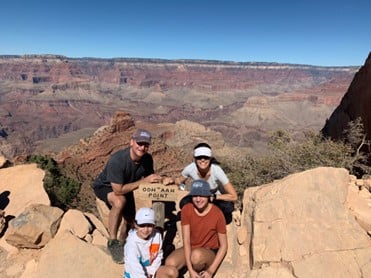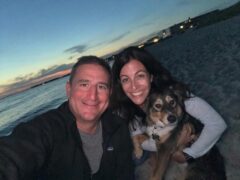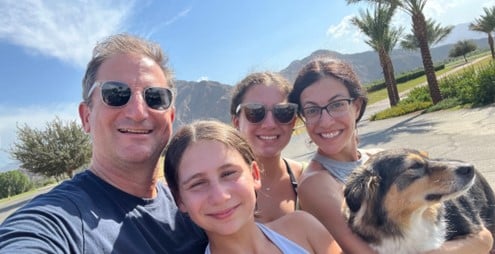Michael, Mantle Cell Lymphoma
Michael, Mantle Cell Lymphoma Survivor
All lymphoma stories are difficult stories. It’s a diagnosis that shocks us. Turns our world upside down. Exhausts us. Some of our stories are filled with hope. Some are terribly sad. Most are some of both.
I am now an over 17-year survivor of mantle cell lymphoma and share my story with you all these years later as an example of how much lymphoma diagnosis, treatment, and prognosis has changed, especially for the terrifying diagnosis I received in 2005.
Two years before my diagnosis, I had felt a tiny lump in my neck, which several doctors told me was nothing to worry about. But when the lump grew two years later, it was biopsied and found to be mantle cell lymphoma—which some of you might know as a rare form of non-Hodgkin lymphoma (NHL), constituting only about 6% of all NHL cases in the United States (i.e., only about 3,000 cases per year). It can be both an aggressive and indolent B-cell lymphoma that usually affects men over the age of 60.

I was diagnosed six weeks after my wedding. I had just left graduate school at Columbia University in New York and had moved to Philadelphia to start my career as an assistant professor at the Drexel University School of Public Health. I was 37, an organic-eating triathlete who did yoga and meditated regularly. I was the epitome of healthy. How could I be sick?
To make my nightmare worse, MCL at that time had a horrible prognosis. Being a scientist, I had already scoured the literature, and what I saw was not pretty. “Despite advances in understanding the molecular pathogenesis of MCL,” reported one team of scientists from the Mayo Clinic in the medical journal Blood, “it remains the NHL subtype with the poorest prognosis. Most patients are diagnosed at an advanced stage, and extra nodal sites are often involved. Even though patients with MCL often respond to therapy, the responses are usually partial and most patients eventually relapse. Aggressive therapeutic regimens yield complete responses in only 38% of patients with a median overall survival of only 3 to 4 years.”
Those statistics forced me to wonder if I’d make it to my 40th birthday. I wondered if my dog would outlive me. I wondered if I’d complete the book I was working on at the time. And I wondered if I’d have children and celebrate life’s joys with them and my wife.

When Dr. Steve Schuster at the Hospital of the University of Pennsylvania took on my case with both the intensity of mind and decency of spirit with which he approaches all his patients, he told me that I should not panic, and that he would do his best to help me survive and someday become an old man. I never doubted him. Steve told me to stop looking at the internet for information about MCL. It’s all wrong. The science is changing, he said, but the literature has not yet.
It turned out that my disease belonged to a sub-group of indolent MCL and was slow-growing, so treatment could be delayed for months, perhaps years if I was lucky. This type of treatment, referred to as “watching and waiting”, was an adjustment. I had an unpredictable and deadly disease just hanging out inside me, and my wife Jacqueline and I were forced to adapt to our new reality. And we did. As quickly as I was diagnosed was as quickly as life got back to my new normal. We bought a home. I wrote and taught. We quickly had a baby on the way.
But despite our hope that my disease could go untreated for years, I was not that lucky and the disease started progressing during the summer of 2006. Jacqui was six months pregnant at the time and again, we were forced to adapt to a new normal.
In August of 2006 I checked into Penn for a rigorous protocol of R-Hypr-CVAD, a brutal chemo regimen that required me to be in-patient every three weeks for three nights for over eight months. That is not counting the four times during chemo I had to be admitted to the hospital for a week at a time for dangerously high fevers due to the chemo wiping out my immune system.
As I said, when chemo began Jacqui was six months pregnant, and she spent many long nights, her belly growing bigger with each chemo cycle, sleeping in the hospital next to me on an air mattress, nursing me through some horrible days and nights.
In November 2006, perfectly timed to be halfway through the protocol, I got a six-week break so I could be scanned up and down the wazoo to see if the chemo was working and so we could have our baby. When I left after my tests, I told my care team that I didn’t want to hear from him for at least a month. I had the month off from chemo anyhow, and I just wanted to be with my new family. I didn’t want to know what lay ahead, especially because if the chemo had not worked it was likely I would undergo a bone marrow transplant.
On November 30th, 2006, our beautiful daughter Sophia was born. The very next morning I got an email from my care team with the great news that the chemo that had made me sick, rendering me unable to take the best care of my lovely wife during her pregnancy, had worked and had quickly put me into remission. I would be ok. I would get to see my daughter grow up.
But life is never so simple, and during that same week of miracles, my father, who himself had battled cancer for almost nine years, had a recurrence. He declined quickly and would pass a few months later while I was tethered to an IV, unable to be with him at his end. My solace in that is that in the months before he died, he was able to spend some nice time with my daughter and that despite the cruel timing of his illness, he got to be a grandfather, however briefly.
It was not an easy time for my family, but in April 2007 I completed my chemo and started returning to a lymphoma-free life again.
Today I live in remission. Over 15 years of it. But remission can be such an ugly word. At least it was to me, although it has grown less ugly as time passes and I stay lymphoma-free. And I suspect that it has that same quality to many of you, and for those of you in treatment, you look forward to remission with great anticipation and also fear it. Remission, that place on the lymphoma road where the signs and symptoms of our disease have disappeared, is for some a fleeting place of respite before the battle begins again, and for others a temporary stop on the way to a cure. Remission suggests something transitory; that something is hiding; lurking in our bodies in a place that cannot be scanned, probed, or extracted. But no matter the ultimate outcome, it is a difficult place to be.
Now don’t get me wrong: I am thrilled to be in remission and 15 years later it has become my place. But living in remission (and I hope that any Californians in the room will excuse this reference) can be like waiting for the “big one”, knowing that the odds are decent that it might occur in your lifetime, but, that, well, it also might just not.
Looking back on that time in my life, it almost seems unreal. I have my health and my hair back, though it’s gotten thinner and a bit grey. My wife and I are raising two beautiful teenage daughters whose smiles lights up our home. And my career is thriving. I stand before you here today as a sign of the progress in treating lymphoma.
I have lived life with a durable remission that dare I say could be permanent because of the research that the Lymphoma Research Foundation and its supporters have fought for. But despite my success as a patient and my durable remission, there are still many moments when life in remission is not easy.
I am, therefore, of two minds. On the one hand and foremost, I am an optimist. Despite what once were intimidating odds, I have no doubt that I will get to share with my loving family the joys and challenges of a full life; that I will live see my daughters grow up and dance at their weddings, and that I will grow old to become a creaky and cranky old man who complains loudly about things like drafts from the air conditioning, the pastrami being too lean, and the fact that kids today don’t know from good music or movies!

On the other hand, I am still a survivor of lymphoma, with the emotional battle scars to prove it. Sure those scars have faded a bit, but they are still there and they can still haunt me.
These contradictions are the essence of life in remission. They are the yin and yang of my daily existence. They are inescapable. Yet, over the past 15 years something inevitable happened. There are now more moments when I forget that I am a lymphoma survivor, than moments when I think of the awfulness that was.
But as all of us who are survivors know, and even, I suspect, those who are considered cured, we have all been irrevocably changed by our experience with this disease. And because lymphoma itself is a disease filled with contradictions—some lymphomas are easier to treat than others, some are curable while others are chronic, and while we know lymphoma is a form of cancer, popular sentiment is often ignorant of this fact—our own internal struggles are thus reinforced.
I have decided instead that meaning has and will come from the way in which I live my life; the type of father, husband, son and brother I am; the way I commit myself to my friends, my colleagues, and my community; and the way I dedicate myself to improving the lives of other lymphoma patients through the work I do as part of the Lymphoma Research Foundation.
I must admit that these contradictions have had effects on me that I do not always like. The moments that feel the worst are the moments when I feel angry that this has to be a part of my life, that my wife, who lost her mother at a young age to cancer has again been forced to consider an indescribable loss and that my daughters may not always feel me close to them. I am also angry at the way in which lymphoma stripped away my innocence. My father survived cancer for almost a decade so I was not ignorant of what illness can do, but, heck, I was diagnosed at 36, three weeks after my wedding.
The only way I have been able to make sense of my situation, and of the suffering and pain that I have seen around me, is to conclude that there is NO sense to make of this, and that obsessing about a cosmic cause for my lymphoma is ultimately meaningless.
I have decided instead that meaning has and will come from the way in which I live my life; the type of father, husband, son and brother I am; the way I commit myself to my friends, my colleagues, and my community; and the way I dedicate myself to improving the lives of other lymphoma patients through the work I do as part of the Lymphoma Research Foundation.
In other words, I have been forced to take from the contradictions so inherent in lymphoma to choose life. And for me there have been a couple of things that have gotten me to this place that I’d like to share with you, because I think that in shared dialogue, we can perhaps find our place and our peace in this.
A lymphoma diagnosis is disorienting and turns your world upside down, and one of the best things I did for myself was to talk to a psychologist about what I was feeling. Not only did that take a load off my own shoulders, but it helped me defer some of the fear and anxiety away from my wife and allowed us to take better care of each other.
Second, I dedicated myself to something that could help both keep me in physical shape and also serve as a distraction. The distraction part was so important, because if I didn’t stop poking at my lymph nodes, I might just have poked a hole in my own neck. So, I began talking long walks with my family and dog, and I began to train for a triathlon. Anything that gets you outdoors, breathing in fresh, clean air works. It clears the mind and I think has helped cleanse my soul a bit. When I was feeling extra-stressed about lymphoma in some way, I’d go for a walk or a run and it clears my mind. It helped me from getting too stuck in my own head.
Third, and I suspect this is what has brought us all here today, I have dedicated myself to doing what I can do to providing support for other patients and survivors and to finding new treatments and a cure for lymphoma. A few weeks after my initial diagnosis I spoke to an old friend who had been diagnosed a few years before me with the same rare subtype of lymphoma. He told me of his involvement with LRF, and I asked him what I could do. That began a series of discussions that led to my wife and I, along with a dedicated group of other survivors and family members, to found the Philadelphia/Delaware Valley Chapter of LRF. And that it what brings me here to you today.
And, finally, I never hesitated to reach out to friends and family to talk with them about what I was going through. I knew that for some it would be uncomfortable, either because of their own direct and indirect experiences with illness. But nonetheless, I took the opportunity to create a support group for Jacqui and I, and to also create a network for my friends and family to reach out to one another.
So that’s my story. Lots of hope. Some terrible sadness. Anxiety. Loss. And a lot of love. Good health to you all!